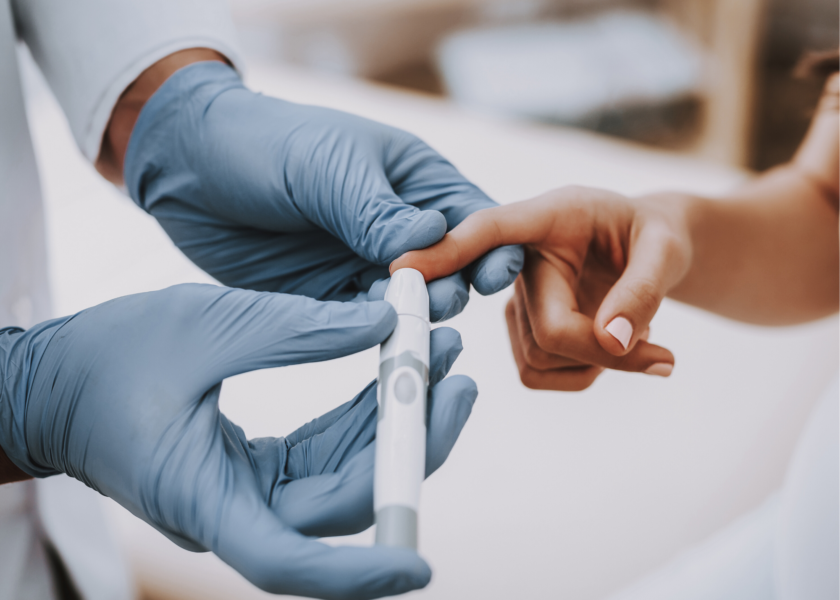Dietitian Blog, Long-Term Care, MNT Guidelines | Aug 23 2022
Diabetic Kidney Disease: Navigating more than one comorbidity

According to the National Institute of Diabetes and Digestive and Kidney Diseases, approximately 1 in 3 patients with diabetes also has chronic kidney disease (CKD).1 Another staggering statistic is the lack of education these patients receive despite the positive impact medical nutrition therapy can have on this population with CKD and diabetes.2,3 The combination of these two conditions is dubbed diabetic kidney disease (DKD). In many cases, nutrition education for this dual condition may not occur until the later stages of when complications are present.
What is Diabetic Kidney Disease?
The kidneys each contain approximately one million nephrons, which act as the main filtering unit of the body to remove extra waste products and water. DKD results from chronic, uncontrolled glucose levels that damage blood vessels in the kidneys leading to reduced filtering capabilities and retention of harmful waste products in the body.
Generally, a healthy adult has an estimated glomerular filtration rate (eGFR) greater than 90 ml/min/1.73m2. As CKD progresses, this filtration rate decreases. At eGFR levels of 15 ml/min/1.73m2 or less, most individuals require kidney replacement therapy or transplantation because kidney function is limited, and problematic symptoms occur.4 DKD can result from Type 1 or Type 2 diabetes, and early screening of blood creatinine levels or presence of protein in the urine are simple and effective tests that can reflect kidney disease.1
Nutrition implications: Where to start
Let’s be honest — for most practitioners, deciding where to begin with the DKD patient can be a bit overwhelming, not only for you but also the patient. Focusing on the basics of diabetes and CKD is a start, but after adding in hypertension, dyslipidemia, anemia, and bone and mineral disease, the list of recommendations seems a mile long.
Suggesting too many diet changes at once is likely to be unsuccessful. Instead, recent guidelines promote individualized education with smaller, more attainable goals designed to improve patient knowledge and promote disease self-management.2,5
Medical nutrition therapy for management of DKD should emphasize several different points and be integrated gradually as part of the patient’s routine in combination with medications and therapeutic lifestyle changes.5-8 The first to consider is blood glucose control. More research is needed to find the ideal amount of dietary carbohydrate percentage for these patients, but incorporating whole grain foods, fruits, and vegetables is encouraged. As CKD progresses, medication and diet recommendations may need to be modified to prevent hypoglycemic episodes. Even though targeting hemoglobin A1c levels of 7.0% has been a standard, this goal may need to be more or less stringent based on the individual patient.5,8
Moderate protein consumption is another key recommendation with non-dialysis DKD patients.8 Numerous studies have compared animal versus plant sources to try and determine the best type of protein for these patients. While there are positive benefits shown with each, the bottom line remains the same — reducing total protein intake can help prevent the eGFR decline seen with CKD progression.5-8
Overall salt reduction and emphasis on the intake of healthy dietary fats are two additional recommendations for DKD patients. The negative impact of a diet high in salt and fat on blood pressure and blood lipid levels, respectively, is widely known. Providing salt alternatives or recommendations for non-processed foods can help your patient reach a goal of 2,300 mg or less of sodium per day. Although individualized goals are suggested for total fat intake, highlighting diet inclusion of omega-3 and omega-9 polyunsaturated fatty acids in place of saturated and trans fats can make a significant impact on your patient’s health.7,8
What next?
Understanding the basics of DKD is just a start. As registered dietitians we have the unique opportunity to educate our patients and know that diet can impact not only blood glucose management but also CKD progression.
Interested in learning more?
Recent publications on chronic kidney disease and diabetes highlight in more detail the recommendations specific to these patients. Check out the KDIGO 2020 Clinical Practice Guideline for Diabetes Management in Chronic Kidney Disease or the American Diabetes Association: Standards of Medical Care in Diabetes – 2022 to learn more.
Dietitians On Demand is a nationwide staffing and recruiting company for registered dietitians, specializing in short-term, temporary and permanent-hire positions in acute care, long term care and food service positions. We’re dedicated to dietitians and helping them enhance their practice and excel in the workplace. Check out our job openings, request your coverage, or visit our store today!
References:
National Institute of Diabetes and Digestive and Kidney Diseases. Diabetic Kidney Disease. Available at https://www.niddk.nih.gov/health-information/diabetes/overview/preventing-problems/diabetic-kidney-disease#:~:text=Diabetic%20kidney%20disease%20is%20a,your%20blood%20to%20make%20urine. Accessed August 7, 2022.
Lopez-Vargas P, Tong A, Howell M, Craig J. Educational interventions for patients with CKD: a systematic review. Am J Kidney Dis. 2016;68(3):353-370.
Andersen C, Nguyen H. Nutrition education in the care of patients with chronic kidney disease and end-stage renal disease. Semin Dial. 2018;31(2):115-121.
Estimated Glomerular Filtration Rate (eGFR). National Kidney Foundation. https://www.kidney.org/atoz/content/gfr. Accessed August 8, 2022.
Kidney Disease: Improving Global Outcomes (KDIGO) Diabetes Work Group. KDIGO 2020 Clinical Practice Guideline for Diabetes Management in Chronic Kidney Disease. Kidney Int. 2020;98(4S):S1–S115.
Ko G, Kalantar-Zadeh K, Goldstein-Fuchs J, Rhee C. Dietary Approaches in the Management of Diabetic Patients with Kidney Disease. 2017;9(8):824.
McCann L. Pocket Guide to Nutrition Assessment of the Patient with Kidney Disease. 6th National Kidney Foundation;2021.
American Diabetes Association: Standards of Medical Care in Diabetes- 2022. Available at: https://diabetesjournals.org/care/issue/45/Supplement_1. Accessed August 5, 2022.
Who we are
Dietitians On Demand is the nationwide leader in providing dietitians with jobs they love. If flexibility, competitive pay, a full benefits package, free CPEUs each month and a team dedicated to dietitians sound good to you, apply to our positions today.




